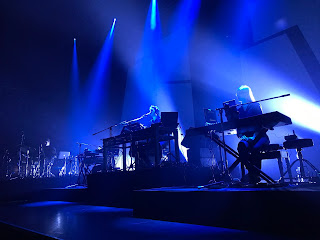Oneohtrix Point Never at Tsutaya O-East, September 12th 2018
You know that moment at a concert when, after the musicians walked onto stage, a short intro is played and suddenly there’s that music note that marks the start of the show. All of a sudden the crowd goes nuts, and you can hear “woos!” coming from different parts of the theater. We had that moment at this show, and that note was played by a harpsichord.
The harpsichord was used in operas during the baroque era and a little bit beyond that, to accompany recitatives. Those sections between the big numbers, or arias, in which the singer deliver his or her lines in a half-sung, half-spoken way. From the musical perspective recitatives are insignificant compared to the importance of arias. They are used, paradoxically, to advance the plot, to tell the story. From a narrative point of view they are essential. These type of contradictions exist in the harpsichord itself. Once a symbol of opulence, it’s now as obsolete as it could possibly be.
Oneohtrix Point Never embraces these contradictions. You can see it in the poster’s imagery, in which the characters of Gargantua and Pantagruel could be the result of radiation exposure, as described in the song Black Snow. It’s also in the images projected in the background, placing abstract shapes and object in the middle of domestic environments like a living room, a kitchen or a bedroom. Abstraction also looms in the city skyline while Babylon is performed. It’s in the sound of the harpsichord that pumps the crowd.
“It’s an open invitation to try to find the bottom of a bottomless hole” he sings in The Station, and indeed it is, both demanding and rewarding to witness his musical ideas delivered in a live setting. For this tour his joined by three musicians, including a live drummer, adding an organic natural sound to the electronic landscapes. That combination of glitchy sounds with a steady beat from real drums was enthralling.
His previous album, Garden of Delete, took cues from metal. The latest, Age Of, was inspired by R&B, which means that the abrasiveness is toned down to a certain extent and groove becomes part of his idiom. It could be a somewhat more accessible sound, but there are no compromises. OPN’s music retains its challenging vein. At the show there were instances that sounded like post-rock, others that were more jazz oriented, and of course there was some R&B flavor.
Daniel Lopatin sang lead vocal in a few numbers, manipulating his voice, adding all kinds of effects to it. The above mentioned Black Snow, included a group of dancers wearing surgical masks and cowboy hats, that -speaking of contrasts- did some kind of country line dance routine through it, proving that humor is equally embraced.
The show, which started with Daito Manabe setting up the mood with a set of electronic music that transitioned flawlessly to the main act, ended with Lopatin on lead vocals singing a rendition Bill Fay’s recent Never Ending Happening. The melancholic atmosphere of this ballad was depicted on screen with images of earth from space and beams of light hovering over it, reminiscent of Kubrick’s 2001. The quad sound effects that surrounded the whole venue with those distorted vocals ended on a climax that was both thrilling and poignant.
The musicians came back for an encore in which they played a couple of tunes from the previous last two albums. In Child of Rage we first got to hear that ominous organ sound that was sort of a trademark of his from that era. He closed the show with Chrome Country, R Plus Seven’s last song.
There’s a thread between those two songs and that’s children. The first one contains a sample from a documentary that explains its title and the second one has that anthemic children choir sound that’s epic. In the latter one there were images of an object that resembled a machine gun projected on screen. Couldn’t help thinking about school shootings, innocent victims of war and displacement. At the same time, and making a connection with the first part of the show that addressed history as steadiness and questioned progress, an anachronistic thought crossed my mind: hope. What a way to end such a thought-provoking and mind-blowing performance.
Thank you for reading. Please follow me on Twitter at @ConcertTokyo. You can also click the Like button and get notifications at https://www.facebook.com/ConcertTokyo/





Comments
Post a Comment